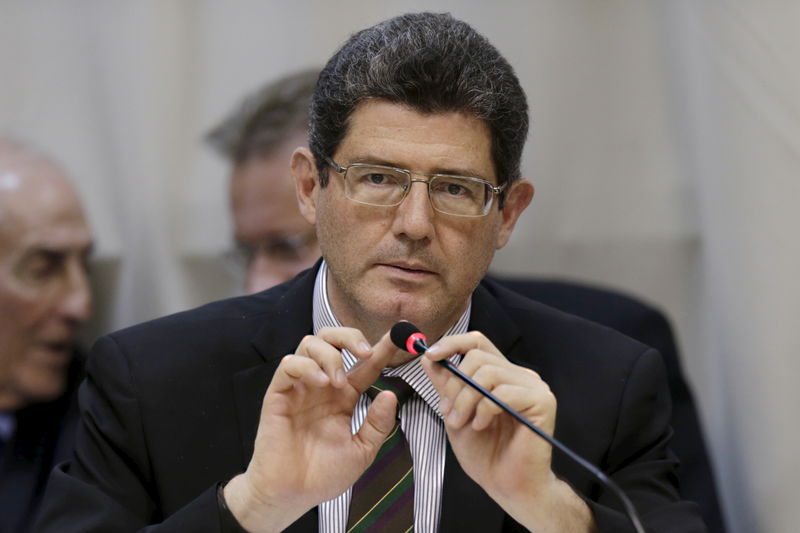By Alonso Soto and Brian Winter
BRASILIA/SAO PAULO (Reuters) - Brazil Finance Minister Joaquim Levy's four-month-old austerity plan is encountering growing resistance in Congress, as some legislators say his policies may deepen a looming recession.
This week, leaders in President Dilma Rousseff's own Workers' Party refused to pass a reduction in social welfare benefits designed to save the government 9 billion reais (2 billion pounds) this year. Instead, the House of Deputies narrowly passed a watered-down version of the bill that reduced the measures' estimated savings by at least 2 billion reais.
Even though the Bovespa share index is up about 16 percent since Levy took office, the unemployment rate is still rising and so is the nation's primary deficit, raising questions about whether his plan of budget cuts and tax increases will put Brazil's finances in order after years of high deficits and disappointing growth.
"(Levy) is shooting himself in the foot," Paulo Paim, a senior Workers' Party senator who introduced many of the changes in the watered-down bill, told Reuters. "I don't think these measures will make us grow more in the future. They make the recession worse."
Brazil's economy has been stagnant for most of the past four years, and is expected to shrink 1.2 percent this year, according to the average forecast of economists in a weekly central bank poll. Rousseff's generous spending and tax breaks in her first term left Brazil with an overall deficit of 7.8 percent of GDP in the 12 months through March, and contributed to annual inflation currently at 8.2 percent, well above the government's 4.5 percent target.
The time has come for Levy to show austerity "was in fact necessary," Leonardo Picciani, the allied Brazilian Democratic Movement Party's (PMDB) leader in the lower house, told Reuters. "Once the house is in order, we need economic growth to come back."
The finance ministry declined to comment. Levy has said the government's "tremendous" austerity efforts will help the economy start growing again later this year as confidence and investment bounce back.
In the wake of the vote on the benefits-reduction bill, Levy on Thursday called the budget deficit the "biggest risk" to Brazil's stability. He urged Congress to quickly approve further austerity measures or else "the costs will be higher."
Economists have warned that, without cuts, Brazil would face an exodus of capital, higher borrowing costs for the government and families, and a possible currency crisis.
On the other hand, other countries have tried to narrow budget deficits at a time when economic activity is weakening, and it hasn't worked out, either politically or economically.
"This is a path that has already been trodden by several developed economies since the global financial crisis – and their experience suggests that investors in Brazil should now brace themselves for a series of missed targets for deficit reduction," according to a note from Capital Economics, a London-based consultancy.
DIFFERENT FROM 2003
Some pushback against unpopular measures was always expected. Indeed, Brazil has been down this road before.
In 2003, then-President Luiz Inacio Lula da Silva held off protests from the left wing of the Workers' Party to push spending cuts through Congress. The savings restored investor confidence, and Brazil's economy boomed in ensuing years, helped also by a surge in commodity prices.
This time, though, the challenge appears greater.
Unlike Lula, who was enormously popular, about two-thirds of Brazilians express disapproval of Rousseff in polls as unemployment rises and she deals with a corruption scandal at state-run oil company Petroleo Brasileiro SA (SA:PETR4).
The cuts themselves will also be deeper and longer-lasting. Alberto Ramos, an economist at Goldman Sachs, said it will likely be a "three-year process" to bring the primary surplus - its budget balance minus debt interest payments - back to 3 percent of gross domestic product, the level he said is needed to stop Brazil's gross debt from rising further.
Ramos warned the austerity drive "has yet to start in earnest" - highlighted by the government's posting of a primary surplus of just 239 million reais in March, well short of the 5.15 billion reais analysts had expected.
The primary deficit climbed to 0.70 percent of GDP in the 12 months through March, putting the 1.2 percent surplus target Levy has set for 2015 in doubt.
Ramos said investors will likely give Levy the benefit of the doubt, even if he misses the 2015 target, because of his credibility as a budget expert and former banking executive.
But Rodrigo Almeida, a political analyst with consultancy Barral M Jorge in Brasilia, said Congress will be much less forgiving - and that the government's already strained coalition of 19 parties could fracture.
"Unless things get better, the rats could start to abandon the ship," Almeida said.
Wellington Moreira Franco, a long-time PMDB leader and former aviation minister under Rousseff, told Reuters members of his party were questioning why they should support austerity if elements of the Workers' Party did not.
"We're going through a very deep political crisis," he said.
Meanwhile, unemployment has risen to a three-year high of 6.2 percent in March, while recent teacher strikes in the states of Parana and Sao Paulo have highlighted the strain of tight budgets on everyday Brazilians.
Overall, Ramos said investors are "suspicious" of whether Levy will have the support needed to be effective, especially with another round of belt-tightening likely to occur by late this year.
"Do they have the degree of conviction and resilience to stick for this as long as it's needed? We don't know," he said.
